高一必修一unit 5教案(完整资料)
英语必修一unit5教案

英语必修一unit5教案【篇一:高一英语必修1 unit5教案】unit 5 nelson mandela– a modern hero一、单元教学目标和要求(teaching aims and demands)二、教材内容分析(analysis of the teaching materials)三、教学安排(teaching arrangements)四、单元预习任务(pre-unit activities: preview task)五、教学步骤 (teaching procedures)六、背景参考资料(background knowledge)七、评价与反思(assessment and reflection)临海市回浦中学李珊珊陈晓平余晶晶一、教学目标和要求(teaching aims and demands)根据课程标准实验教材(英语必修)关于总目标的具体描述,结合高一学生实际和教材内容,我们将教学目标分为语言知识、语言技能、学习策略、情感态度和价值观四个方面。
1.语言知识(knowledge)词汇(vocabulary):能理解、内化、运用以下生词---- hero, quality, willing, active, republic, fight, peaceful, prison, prisoner, period, law, advise, continue, fee, gold,youth,league,stage,vote,position,accept,violence,equal,blanket,degree,guard,educated,terror,fear,cruelty,reward,right(n.),criminal,leader,president,sentence(v.),sincerely短语(phrases and expressions):lose heart, in trouble ,worry about, out of work, youth league, as a matter of fact, blow up, put ... in prison, come to power , set up , be sentenced to功能(functions):学习掌握一些用于发表意见与评论的结构句式,如:1.发表意见(giving opinions)why do you think so? what do you think of ...? whats you opinion?agree / dont agree.i think / dont think .... i prefer .... in my opinion .... im afraid ....2.评论(making comments)good idea! thats an excellent idea.语法(grammar):定语从句(ii)(由where, when, why, 介词+ which, 介词+ whom引导的定语从句)扩展词汇:negative(消极的), heroine(女主角,女主人公), unwilling(不情愿的), nation(国家,民族), sacrifice(牺牲),realize(认识到), give up(放弃), riches(财富), bible(圣经), revolution(革命), career(职业), equality(平等), fairness(公平), conflict(冲突), biography(自传), beliefs(信仰), christianity(基督教), religion(宗教), priests(牧师), version(翻译), readable(易读的), adventure(冒险), scholar(学者), sympathy(同情), ,campaign(从事活动), communist(共产主义者), injustice(不公平), oppose(反对), pilot(飞行员), boycott (联合抵制)。
高一英语必修一unit5教案模板
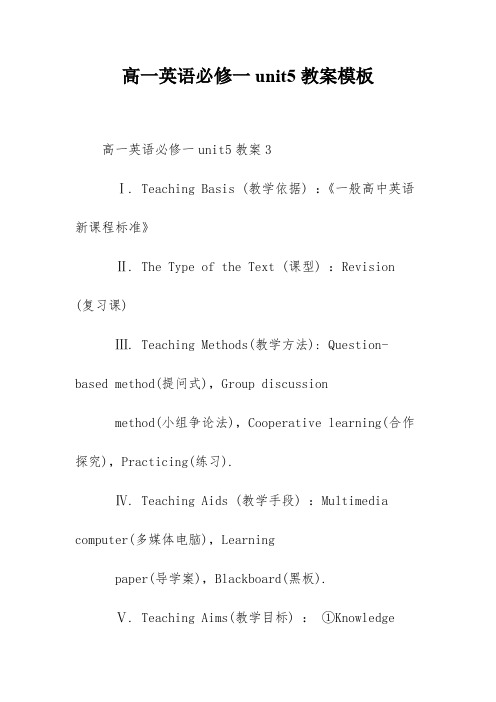
高一英语必修一unit5教案模板高一英语必修一unit5教案3Ⅰ. Teaching Basis (教学依据) :《一般高中英语新课程标准》Ⅱ. The Type of the Text (课型) :Revision (复习课)Ⅲ. Teaching Methods(教学方法): Question-based method(提问式),Group discussionmethod(小组争论法),Cooperative learning(合作探究),Practicing(练习).Ⅳ. Teaching Aids (教学手段) :Multimedia computer(多媒体电脑),Learningpaper(导学案),Blackboard(黑板).Ⅴ. Teaching Aims(教学目标) :①Knowledgeaims(学问目标):words: achievement, specialist, organization, hard-working, confident.. phrases: put to death, mean doing, eitheror, the bond between, structure: only+., It is/was+.+that. grammar: Subject-verb agreement.②Ability aims(力量目标): Develop the students ability to use the importantlanguage points, enable students to describe people using the adjectives.③Emotional aims(情感目标): Encourage the students to think about what makes aperson great.Ⅵ. Teaching focuses(教学重点):Get the students to review and consolidate what theyhave learned in this unit.Ⅶ. Teaching difficulties(教学难点):Get the students to turn what they have learned into their ability.Ⅷ.Teaching procedure(教学过程): Step 1 复习学案状况反馈(1分钟)Step 2 lead-in :通过图片展现的方式,过渡到学问竞答类节目《一站究竟》,本节课也将仿照这种模式授课。
高一英语必修一unit5教学设计

Earthquakes 教学设计课题: ―A night the earth didn’t sleep‖(UNIT4 高中英语必修1)课型:reading指导思想与理论依据遵循学生的认知规律,引导学生去发现问题、分析问题和解决问题,从而掌握知识,形成能力,培养品质。
根据新课程标准的三维教学观,通过引导学生开展探究学习、合作学习、任务型学习的活动,整合发展学生语言技能、语言知识、情感态度、学习策略和文化意识五个方面的素养,培养学生综合运用语言的能力。
教材分析本节内容必修一中的unit4 earthquake reading部分―A night the earth didn’t sleep‖ 本单元的中心话题是―地震‖,地震给人民生命财产造成的巨大损失。
阅读部分是一篇记事文章,根据话题描述河北西北部1976年7月28那次地震。
本文通过震前、震中和震后的详细描写,使学生了解地震如何发生的一些常识,意识来自然界的巨大威力。
通过震后的描写,让学生从中了解了震后的救助的方法,感受到了解放军和工人的奉献精神。
通过本文的学习,唤醒学生把握现在,珍惜现在,爱护环境,保护自然的意识。
本文分为四个自然段,按照事件发生的先后描写过程,运用了一些描绘地震的生动形象的词汇和复合句,如―shake, crack, burst, rose and fell, at an end, A huge crack that was eight kilometers long and thirty metres wide cut across houses, roads and canals.等。
使学生在语境领略英语这种语言的内涵,学会词汇特定语境中的使用和定于从句的用法。
学情分析高一学生虽然思想活跃,求知欲旺盛。
但是对英语学习态度不明确,班上的英语基础知识很差,英语基础仍然停留在初一的基础上。
本文信息现实生活的写照,与学生的生活息息相关并且会引起他们的学习兴趣,特别是如何在地震这样的自然灾害中自救。
高一英语必修一unit5教案
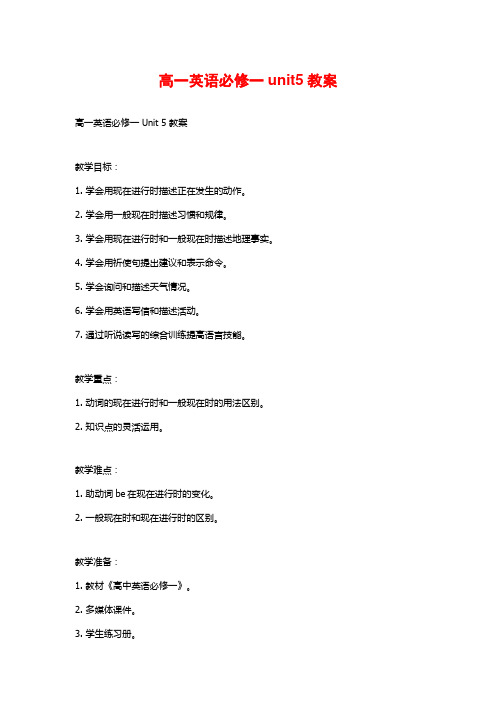
高一英语必修一unit5教案高一英语必修一 Unit 5 教案教学目标:1. 学会用现在进行时描述正在发生的动作。
2. 学会用一般现在时描述习惯和规律。
3. 学会用现在进行时和一般现在时描述地理事实。
4. 学会用祈使句提出建议和表示命令。
5. 学会询问和描述天气情况。
6. 学会用英语写信和描述活动。
7. 通过听说读写的综合训练提高语言技能。
教学重点:1. 动词的现在进行时和一般现在时的用法区别。
2. 知识点的灵活运用。
教学难点:1. 助动词be在现在进行时的变化。
2. 一般现在时和现在进行时的区别。
教学准备:1. 教材《高中英语必修一》。
2. 多媒体课件。
3. 学生练习册。
教学过程:Step 1:导入新课(5分钟)教师通过图片或实物引入新课,让学生猜测图片或实物所代表的词汇,并引导学生运用现在进行时进行描述。
Step 2:新课讲解(10分钟)通过多媒体课件,教师讲解现在进行时的基本构成和用法,并与一般现在时进行对比。
教师需要注意解释助动词be在现在进行时中的变化形式。
Step 3:练习(15分钟)1. 学生通过练习册完成现在进行时的练习题,巩固所学内容。
2. 学生通过小组活动,互相用现在进行时描述图片或实物,提高他们的口语表达能力。
Step 4:教师示范(10分钟)教师通过多媒体课件展示一些图片或实物,并运用一般现在时句型进行描述。
同时,教师将一般现在时和现在进行时进行对比,让学生理解两者的区别。
Step 5:练习(15分钟)学生通过练习册完成一般现在时的练习题,巩固所学内容。
学生也可以在小组活动中互相提问和回答,以增加口语训练的机会。
Step 6:拓展(10分钟)教师通过多媒体展示世界地图,引导学生提问和回答关于国家的位置、人口和面积等问题,并运用现在进行时和一般现在时进行描述。
Step 7:练习(15分钟)学生通过练习册完成地理事实相关的练习题,巩固所学内容。
同时,学生也可以在小组活动中进行口语训练,提高语言表达能力。
【教案】Unit+5Discovering+useful+structures教学设计人教必修第一册
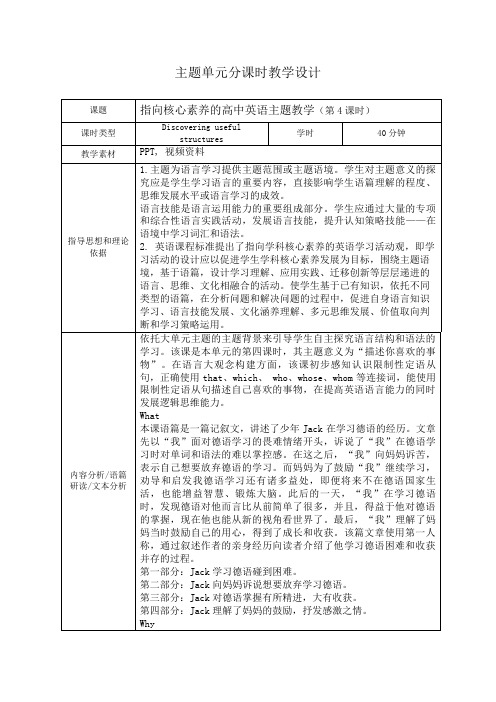
主题单元分课时教学设计课题指向核心素养的高中英语主题教学(第4课时)课时类型Discovering usefulstructures学时40分钟教学素材PPT, 视频资料指导思想和理论依据1.主题为语言学习提供主题范围或主题语境。
学生对主题意义的探究应是学生学习语言的重要内容,直接影响学生语篇理解的程度、思维发展水平或语言学习的成效。
语言技能是语言运用能力的重要组成部分。
学生应通过大量的专项和综合性语言实践活动,发展语言技能,提升认知策略技能——在语境中学习词汇和语法。
2. 英语课程标准提出了指向学科核心素养的英语学习活动观,即学习活动的设计应以促进学生学科核心素养发展为目标,围绕主题语境,基于语篇,设计学习理解、应用实践、迁移创新等层层递进的语言、思维、文化相融合的活动。
使学生基于已有知识,依托不同类型的语篇,在分析问题和解决问题的过程中,促进自身语言知识学习、语言技能发展、文化涵养理解、多元思维发展、价值取向判断和学习策略运用。
内容分析/语篇研读/文本分析依托大单元主题的主题背景来引导学生自主探究语言结构和语法的学习。
该课是本单元的第四课时,其主题意义为“描述你喜欢的事物”。
在语言大观念构建方面,该课初步感知认识限制性定语从句,正确使用that、which、 who、whose、whom等连接词,能使用限制性定语从句描述自己喜欢的事物,在提高英语语言能力的同时发展逻辑思维能力。
What本课语篇是一篇记叙文,讲述了少年Jack在学习德语的经历。
文章先以“我”面对德语学习的畏难情绪开头,诉说了“我”在德语学习时对单词和语法的难以掌控感。
在这之后,“我”向妈妈诉苦,表示自己想要放弃德语的学习。
而妈妈为了鼓励“我”继续学习,劝导和启发我德语学习还有诸多益处,即便将来不在德语国家生活,也能增益智慧、锻炼大脑。
此后的一天,“我”在学习德语时,发现德语对他而言比从前简单了很多,并且,得益于他对德语的掌握,现在他也能从新的视角看世界了。
高一英语必修一UNIT5教案

篇一:高一英语必修一unit5教学设计教材分析我教的是高一年级上册,人教版,必修1, unit5, nelson mandela---a modern hero 的第一课,这是一节高中阅读课。
教材上这一部分主要分为四个部分:由于第一、二部分联系比较紧密,活动设置也比较好,但我觉得这两部分的活动顺序可以调整一下,即把第二部分放在前面,先呈现图片和简介以引起学生注意力和兴趣,以图片展示的形式激励学生用英语进行语言实践活动,然后归纳出hero的一个模糊标准,为阅读活动做好铺垫。
然后再让他们自己说出他们所认为的a great person 所拥有的品质,这样可能更符合学生的思维习惯特点,并且有利于调动他们的积极性和培养他们说语言的能力。
因此,我决定吧第一、二部分结合在一起作为pre-reading 部分来讲,但顺序做一下调整,之后是正式人物曼德拉的登场,进入主题alias眼中的曼德拉,重点把nelson mandela 挑出来,附加更多关于他的信息,稍加重点地呈现,因为他的信息与接下来的reading passage 联系非常紧密,我想通过重点呈现关于他的信息来提高给学生更多background information,帮助他们更好地理解reading text.第三部分是一个关于elias’ story 的reading text,属于人物传记式的阅读,但是文章的写作角度比较特别,由穷苦的黑人工人alias叙述他眼中的曼德拉,这样的写法比较客观可信。
alias的故事与遭遇同时也成为本文与本课的一条贯穿总线,也是这堂课的中心阅读任务。
学生要做的主要活动就是阅读并理解文章的内容和大意,同时注意一些重点细节信息的把握。
另外,在时间允许的情况下,我还想做一些扩展性的教学活动,比如让学生复述alias 的经历,即达到检测学生的理解又能挑战学生说英语的能力。
the background of students:(1) the supporting background information should be given to students before reading to get them ready and not feel difficult.(2) the teaching procedures and reading task should be designed adaptive to students’ current ability and their cognitive style.(3) teacher should give students necessary guidance on reading strategies(4) teacher should be amiable and patient to make students less nervous.correctly to encourage them and improve their confidence.teaching plan for s1 a reading lesson (lesson 1, unit 5, 必修1)nelson mandela---a modern heroname: 颜巧云 class: english 07(4) group: 4-1teaching/learning objectives4. develop reading skills: skimming, scanning and generalizing the central meaning of the textteaching procedures:stage1. pre-reading (5-10 minutes)do you think he is a great man?step2. guess game for prediction (present pictures of 6 famous persons both in nelson mandela.step2. check ss’ understanding of the main idea of each paragraph through matching.step2. guide ss to finish t/f exercises and give their reasons to check ss’understanding of specific information.information and train their independent thinking and judgment, and help to enhance their ability to organize their ideas logically.people equal?e.g. 1940: born1946: six, educated, 2 years1948: leave school, could not pay fee……….stage3. post-reading (10-15 minutes)step2. listen to the tape and read the quotes from nelson mandela to help ss feel the passion and the firm faith of the great man.step3. guide ss to summarize and explore the implied meaning of the text---a great man need not to be famous, he / she must have some good qualities and devote themselves to helping others.(1) ss try to summarize the language points by themselvespart of verbatim plan for lesson1, unit5, s1a, 必修1-----nelson mandela- a modern herot: (after greeting ss)ss: (some ss may give their opinions)t: do you think he is a great man?ss: yes/no.ss: yes/ no.ss: (get into brainstorming)…t: ok, class, have you finished it?ss: yes.篇二:人教版高中英语必修一 unit 5教案unit 5 nelson mandela——a modern hero教材分析:本单元以 nelson mandela —— a modern hero 为话题,目的在于使学生了解一个伟大的人应具备怎样的品质,学会表达自己的观点,并用所学的句型来描写一个伟人。
人教版高中英语必修一教案Unit 5 Nelson Mandela (含答案)
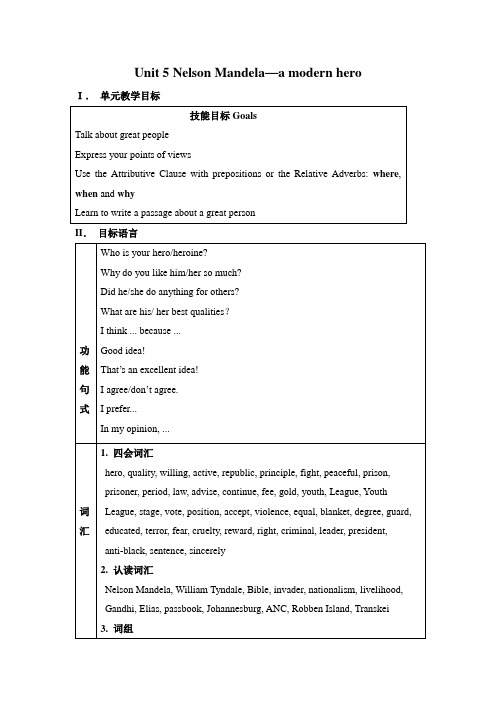
Unit 5 Nelson Mandela—a modern hero I.单元教学目标II.目标语言III. 教材分析和教材重组I. 教材分析本单元以Nelson Mandela —— a modern hero 为话题,目的在于使学生了解一个伟大的人应具备怎样的品质,学会表达自己的观点,并用所学的句型来描写一个伟人。
1.1 Warming Up列出一些形容词让学生判断一下哪些可以用来描述伟大的人,一个伟大的人应具备怎样的品质。
1.2 Pre-reading给学生提供了六个名人的图片,要求利用图片下面标注的人物的重要事迹以及学生对他们的了解,来判断这六个人谁是伟人,谁是重要的人但不是伟人。
1.3 Reading介绍Elias的生平,向学生展示Nelson Mandela是一个怎样的人。
这是一篇记叙文,让学生学会利用时间顺序描述一个人一生的主要活动。
1.4 Comprehending练习1和3帮助学生利用判断正误和时间顺序来整体理解课文。
练习2和4要求学生进一步了解课文细节。
1.5 Learning about Language分词汇和语法两部分。
其中Discovery useful words and expressions是根据课文语境在运用中掌握词汇,Grammar是有关关系副词where, when, why以及“介词+关系代词”引导定语从句的用法,并通过练习加以巩固。
1.6 Using Language分为三部分,一是Listening,练习听力可配合P72的Listening Task进行。
二是Reading,这也是一篇精读文章,更详细地了解曼德拉。
三是Writing,要求利用时间顺序简要地描述一个人。
2. 教材重组2.1 因本教材重点强调的是阅读能力,故将Reading, Comprehending,Using Language 中的Reading合在一起设计成一节“阅读课”(一)(精读课)。
高一英语必修一unit5教案

高一英语必修一unit5教案高一英语必修一unit5教案1(一) 教材地位和教学内容分析本课是高一必修模块1第4单元的阅读课型,这单元围绕earthquakes这一主题开展听、说、读、写多种教学活动。
Reading设计为本单元的第2课时。
本课型是单元整体教学的重要环节,为学生的语言学习、语法学习提供了载体,并且是学生获取信息的主要来源。
“Reading―――A NIGHT THE EARTH DIDN’T SLEEP”具体描写1976年唐山大地震的震前、震中和震后。
本篇文章词汇量大,运用了大量的动词、复杂的数字,出现许多定语从句,篇幅较长,并且采用一些修辞手法,对学生的语言阅读能力提出了更高的要求。
但文章的结构较明显,较容易归纳出各部分的中心词。
(二)教学目标1. 语言知识目标:a)使学生了解自然灾害的相关词汇,并掌握复杂数字的表达法。
b)学习掌握与地震相关的词汇,如:shake,well,rise,smelly,pond,pipe,burst,canal,steam,ruin,injure,destro y,brick,dam,useless,steel,shock,quake,rescue,electricity,disaster,arm y,organize,bury,coal,mine,shelter,fresh,percent等,以及right away, at an end, dig out, give out, thousands of以及一些优美句子的赏析。
2. 语言技能目标:a)阅读技能的训练:让学生学会克服生词障碍,通过略读,归纳出文章的大意;通过细读,理清文章的总体框架与脉络,归纳出各部分的中心词;通过查读,捕捉文章的重要细节,培养学生获取、处理信息的能力。
b) 让学生复述课文,分析、感悟作者的写作意图。
c) 让学生运用本节课所学词汇、知识,通过采访唐山大地震幸存者的形式进行小组活动,提高学生用英语进行创造性交流的能力。
高一英语必修一第五单元教案

高一英语必修一第五单元教案高一英语必修一第五单元教案「篇一」一、教学目标知识目标1. Get students to learn some useful new words and expressions in this part。
2. Get students to read the play。
3. Let students learn the expressions of ordering food。
能力目标1. Develop students’ reading skills and enable them to learn how to use different reading strategies to read different reading materials。
2. Enable students to understand and act out the play。
3. Have students learn how to use the expressions to order food。
情感目标1. Stimulate students’ interests of learning English by reading and acting this play。
2. Develop students’ sense of group cooperation and teamwork。
二、教学重点1. Develop students’ reading and speaking skills。
2. Let students read and act the play。
3. Have students learn to use the expressions to order food。
三、教学难点1. Enable students to learn to use reading strategies such as skimming, scanning, and so on。
新人教必修一Unit 5 Languages Around the World教案

Unit 5 Languages Around the World-Listening andSpeaking【教材分析】不同于旧教材,语言差异在必修一的第二单元,新教材设置在必修一最后一个单元,可以让学生在语言上有所储备,就是在前几个单元的学习中,既有语言知识,也有语音知识,到了这个时候学生就能够有话可说,有感可发,能够找到不同国家英语的区别。
让学生学习不同国家和地区的英语,就可以培养学生的国际视野,可以降低学习英语的恐惧感,也可以让学生明确自己的目标。
【教学目标与核心素养】1.语言能力目标新课标重视培养学生语言的使用能力,本单元通过听来带动说,和平时生活紧密相关,让学生可以体会到不同国家使用英语的过程中会有不同的口音,中式英语也肯定具有它的特点,但是作为语言学习者,我们应该尽量模仿英美国家使用语言的地道性,这样可以拓展学生的国际视野,有助于下一步的开展跨文化交流。
2.学习能力目标:在听力当中,学生应该有效规划学习方法,选择恰当的策略与方法。
这节课,教师可以侧重培养在听的过程中让学生记录关键信息,写下关键词的训练,让学生不是为了做题而听听力造成的紧张感,又不能在听的过程中只见树木不见森林。
【教学重点】(1)在听的过程中先听懂,然后快速记录下关键信息,并通过交换信息来获取更多信息;(2)明确自己要听的主要内容集中精力抓住重点。
【教学难点】(1)听力中涉及到数字一直是学生听力的难点,要让他们对于20以内的数字比较熟悉,才能听到之后立马反应过来;Unit 5 Languages Around the World-Reading andThinking【教材分析】本节课是高中英语第一册的最后一个单元的阅读和思考部分,文章难度明显增加,体现在以下几个方面:文章题材是说明文,比较难理解;话题生疏,涉及到历史等知识;生词量增大,而且在语境中理解词汇的要求提高。
面对这些,教师的难度和高度也要有所提升,通过探讨说明顺序,了解背景知识等帮助他们找到说明文阅读的方法。
高一英语必修一第五单元教案

高一英语必修一第五单元教案单元语言素材涉及过山车、蹦极运动、自由落体车、赛车等娱乐方式及各类主题公园的不同特色,具有很强的时代气息,贴近学生生活,有利于学生了解生活、运动与休闲,了解中外文化,增添世界意识,有利于培育主动的生活看法。
一起看看高一英语必修一第五单元教案!欢迎查阅!英语必修一第五单元教案1本单元的Warming up部分以图片形式引入本单元的话题之一:amusement parks;并通过师生或生生自由问答,让学生了解并沟通个体各类活动方面的体验、爱好及理由,从而引出话题amusement parks 和theme parks,为听力部分和阅读部分作必要的铺垫。
Listening提供一个会议事例:在我市建一个主题公园的招标大会上,Fun Fun Productions and Merry Rides Limited两个不同特色公司的代表人发表演说表达各自优势以争取承建权。
在听音之前需要作恰当的导入,听时做课文1、2部分,听后再作小组商议:选择哪一家公司作为承建商及给出相应的理由。
这一话题具有社会性,时代性特点,在课堂上可以激发学生模拟真实语境进行创造性对话活动。
Speaking紧紧围绕“问路与指路”话题:课内提供一张公园平面图,学生根据出发点和目的地的联系进行有意义的对话实践。
Post-speaking内容扩展至生活实际状况。
Reading是一篇介绍主题公园的说明文。
它包括主题公园的定义、特点,同时介绍了the World Park of China, the Ocean Park of Hong Kong, Disneyland in California三个不同的主题公园,引导学生了解和比较主题公园的不同主题,激发学生联想主题公园的将来进展。
Post-reading部分鼓舞学生自行设计主题公园活动,鼓舞学生主动想象、培育创新能力。
文章结构思路如下:1)What is a theme park? →2)Know about 3 great theme parks:The World park ---People can have fun and experience sth different.The Ocean Park in Hong Kong ---People come for thrills and entertainment and know more about the idea behind the park.Disneyland in California ---The theme is the world of Walt Disney and his characters. →3)New theme parks are being built.篇章结构图示:What is a theme park?Examples:Three parks What do peopleThemes, attractions experience and learn?Theme parks in the future课文线索内容复述如下:When you come to a wonderful theme park, you are sure to enjoy yourself. You can find a collection of rides, exhibitions and other attractions. They are based on a common theme. On one hand , people can have fun, thrills and entertainment. On the other, theme parks are designed to teach people something. Those who come forthrills will also know more about a certain subject, such as life in the ocean, the discovery of the ancient world, and life in the future. What’s more, you may imagine much new things if you think you cannot get enough of scary rides and exciting adventures. Then there will be new designs, and new theme parks will be coming.德育渗透:_ All work and no play makes Jack a dull boy.工作而无娱乐使人愚钝。
unit5必修一高一教案.doc

unit5必修一高一教案篇一:人教版高中英语必修一_Unit_5教案Unit 5 Nelson Mandela——a modern hero教材分析:本单元以Nelson Mandela —— a modern hero 为话题,目的在于使学生了解一个伟大的人应具备怎样的品质,学会表达自己的观点,并用所学的句型来描写一个伟人。
Teaching aims:1. To arouse Ss’interest in learning about heroes in history2. To develop Ss’listening and speaking ability.Teaching procedures:Step1 warming up? Describe yourselvesFirst what kind of person are you?? Discussion?Question 1: Who do you think are the greatest men in your mind? Can you namesome?Question 2: In what way do you consider a man is a great? What is your standard?? Look at page 33 and then ask the Ss if these famous people are great people.? Conclusion:A great person is a person who has followed his or her ideas and sacrificed something so that they could be realized. A pop singer may be very popular with the young people, but he/she is not a great man/woman.A famous person may be well-known but if he or she has not gone through struggles and difficulties for their noble aims, they can not be called a great person.Step2 language points:1.devote vtoneself to 献身于、致力于。
高一英语必修一第五单元教案

高一英语必修一第五单元教案前言高一英语必修一第五单元主要是讲解情态动词和被动语态的用法。
本教案旨在帮助教师在教学过程中更好地掌握教材内容,提高教学效果。
教学目标1.学生能够正确使用情态动词can, could, may,might和should等。
2.学生掌握被动语态的用法及与主动语态的区别。
3.学生能够正确使用现在进行时的被动语态和一般过去时的被动语态。
4.学生能够正确运用所学内容写出简单的应用文。
教学重点1.情态动词的用法。
2.被动语态的用法及其与主动语态的区别。
教学难点1.情态动词的运用。
2.被动语态的使用。
教学方法1.演讲式教学:在教师的讲解下,学生了解各种语法规则和句子结构的特点及其应用。
2.演示式教学:在实例的帮助下,学生更好地掌握所学内容并提高应用能力。
教学内容及安排本单元教学内容分为四部分:情态动词的用法、被动语态的用法与主动语态的比较、现在进行时的被动语态和一般过去时的被动语态的用法。
教学安排如下:第一课时:情态动词的用法1.情态动词can和could的区别与用法。
–辨析can和could在一般现在时、一般过去时和将来时的用法。
–对比can和could的语气:表示请求、给予建议、表达能力、询问能力等。
2.情态动词may和might的区别与用法。
–对比may和might的语气:表示可能性、推测、请求允许和给予同意等。
3.情态动词should的用法。
–表示应该做的事情、提出建议、发出命令等。
第二课时:被动语态的用法与主动语态的比较1.被动语态的定义及常见结构。
–句子中的谓语动词使用被动语态时要用助动词be。
–时间状语和地点状语的固定位置问题。
2.被动语态与主动语态的区别。
–将被动语态作为主语,用主动语态表示同一意思的一个对比练习,帮助学生明确被动语态的意义并运用。
第三课时:现在进行时的被动语态1.现在进行时的被动语态的构成。
–here和now的替换。
–主语使用第三人称单数。
2.现在进行时的被动语态的用法。
高一英语必修一第五单元教案精选5篇

高一英语必修一第五单元教案精选5篇高一英语必修一第五单元教案【篇1】第一部分:热身快速应答:1.How are you going to school everyday?2.Thank you very much for your help.3.Would mind my opening the window?4.What day was it yesterday?5.What's the weather like today?第二部分:朗读口语朗读技巧:1.声调与降调I have three English books, two Chinese dictionaries and five pens. Do you havea map in your hand? Yes, I do.2.连读:将前一个单词最后的辅音与后一个单词开头的元音连在一起朗读。
half an hour ran out of not at all3.失爆:当相邻两个爆破音在一起时,往往给前面一个爆破音留一个位置,但不爆破,稍停随即发后面的爆破音,这种现象称为“失爆”。
hot bath the next day a good deal of I don’t believe I don’t know I want to say朗读练习:1. A smart housewife was told that there was a kind of stove which would only consume half of the coal she was burning. She was very excited, and said: That'll be terrific! Since one stove can save half of the coal, if I buy two, no coal will be needed!2.The little boy did not like the look of the barking dog.It's all right, said a gentleman, don't be afraid. Don't you know the proverb: Barking dogs don't bite?Ah, yes, answered the little boy. I know the proverb, but does the dog knowthe proverb, too?高一英语必修一第五单元教案【篇2】一、教材分析:本课是结合人教版高中英语教材选修5中有关过去分词的语法内容,进行过去分词的学习,教学中将语法知识的传授和语言基本技能的学习结合到一起,注重复习语法与语言的运用。
高一英语必修一unit5教案

高一英语必修一unit5教案教案名称:Unit 5: Meeting Your New Classmates教学目标:1. 通过学习本单元,学生将能够运用描述人物特征和外貌的词汇,并能够进行简单的自我介绍。
2. 学生将能够在日常生活中运用所学的词汇和句型进行交流,并能够发展有效的交际能力。
3. 学生将培养对他人的关心和尊重,增强团队合作意识。
教学重点:1. 掌握描述人物特征和外貌的词汇。
2. 学会运用目标语言进行简单的自我介绍。
3. 发展有效的交际能力。
教学难点:1. 学生能够使用目标语言进行简单的自我介绍。
2. 学生能够在日常生活中运用所学的词汇和句型进行交流。
教学准备:教材:高中英语必修一(人教版)第五单元的教科书、课后习题、配套教学光盘等。
辅助教具:录音机、多媒体设备、图片、班级展示板等。
教学过程:Step 1: Warm-up (5 minutes)1. Greetings: Greet the students and ask them how they are doing.2. Show pictures of people with different appearances (such as tall, short, fat, thin, etc.) and ask students to describe their appearances.3. Ask students to introduce themselves to their classmates briefly.Step 2: Presentation and Practice (25 minutes)1. Introduce new vocabulary related to physical appearance and personality traits, such as tall, short, fat, thin, funny, serious, etc. Use pictures and gestures to help students understand and remember the words.2. Play the audio files to help students practice pronouncing the new words.3. Ask students to work in pairs and describe their partners using the new vocabulary. For example, \。
高一英语必修一u5教案和说课稿
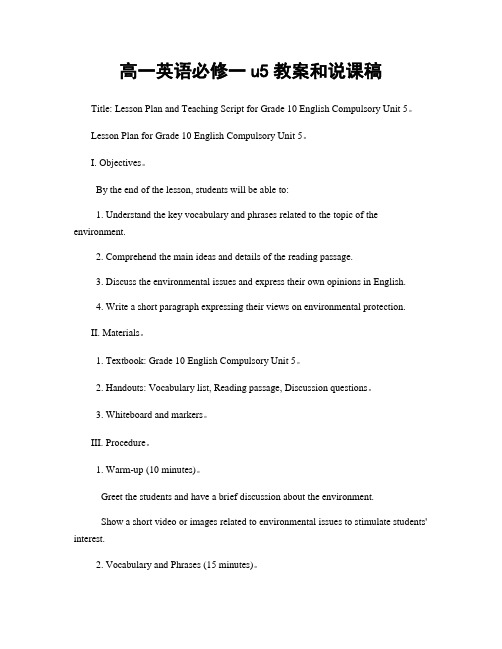
高一英语必修一u5教案和说课稿Title: Lesson Plan and Teaching Script for Grade 10 English Compulsory Unit 5。
Lesson Plan for Grade 10 English Compulsory Unit 5。
I. Objectives。
By the end of the lesson, students will be able to:1. Understand the key vocabulary and phrases related to the topic of the environment.2. Comprehend the main ideas and details of the reading passage.3. Discuss the environmental issues and express their own opinions in English.4. Write a short paragraph expressing their views on environmental protection.II. Materials。
1. Textbook: Grade 10 English Compulsory Unit 5。
2. Handouts: Vocabulary list, Reading passage, Discussion questions。
3. Whiteboard and markers。
III. Procedure。
1. Warm-up (10 minutes)。
Greet the students and have a brief discussion about the environment.Show a short video or images related to environmental issues to stimulate students' interest.2. Vocabulary and Phrases (15 minutes)。
- 1、下载文档前请自行甄别文档内容的完整性,平台不提供额外的编辑、内容补充、找答案等附加服务。
- 2、"仅部分预览"的文档,不可在线预览部分如存在完整性等问题,可反馈申请退款(可完整预览的文档不适用该条件!)。
- 3、如文档侵犯您的权益,请联系客服反馈,我们会尽快为您处理(人工客服工作时间:9:00-18:30)。
此文档下载后即可编辑Unit5 Nelson Mandela--- a modern heroⅠ.Teaching aimsⅰ. Language aims1.Get Ss learn the key words and phrases in this unit (such as quality, mean, active,devote, beg, sentence, out of work, blow up, turn to come to power and so on)2.Get Ss to learn to ask for opinions and give opinions.3.Get Ss to learn attributive clauses based on the former study of unit4.ⅱ. Skill aims1.Get Ss to improve their skills of skimming and scanning.2.Get Ss to use the attributive clauses correctly.3.Get Ss to express their ideas clearly.ⅲ. Affective aims1.Get Ss to learn to recognize the correct value2.Get Ss to set up the awareness of great people and learn some good qualities of thegreat people.Ⅱ.The key points and the difficult pointsⅰ. The key words and phrases in this unit (such as quality, mean, active, devote, beg, sentence, out of work, blow up, turn to come to power and so on)ⅱ. The usage of attributive clauseⅲ.The cultivation of Ss’ fast reading skillsⅢ. Teaching methodsⅰ. Task- based teaching methodⅣ. Teaching procedurePeriod 1 words and expressionsStep1 . Explain the new words and expressions1.quality (n)品质,质量in quality 在质量上in quantity 在数量上2.active(adj)积极的,活跃的(反义词passive)actively(adv), activity(n)3.self(n) 自我,自身selfish (adj)selfless(adj)selflessly(adv)4.devote(Vt) 献身,专心于devoted(adj) 忠实的,深爱的be devoted to doing sth.献身于…….be devoted to sth. 献身于……e.g. He devoted himself to his research for his whole life.5.out of work 失业out短语out of order 混乱,发生故障out of control 失去控制out of date 过时out of mind 心不在焉e.g. 1. She has been out of work since last month.2. The horse was out of control and ran away.6. vote.(Vt, Vi) 投票,选举vote for 投票赞成vote against 投票反对vote on 投票表决e.g. Most of us voted for her, so she was elected as chairman of Students’ Union.7. equal (adj) 相等的,平等的be equal with sb. 与某人平等be equal in sth. 在某方面平等8. turn to 求助于,致力于turn to sb. for help 向某人求助9. opinion (n)意见,看法,主张in one’s opinion/ view 在某人看来as far as I am concerned 就我而言step 2 HomeworkSs make sentences with the following phrases1.be devoted to doing sth.2.out of order3.be equal with sb.4.turn toPeriod 2 Warming up and pre-readingStep 1. Warming up1.Ss read and explain the Chinese meaning of the adjectives on page 33 by turn2.Ss discuss with their desk mates about the qualities that a great people has, andthen to stand up and give their own ideas.3.The T gives some comments on their performanceStep 2. Pre-readingThe T introduces the six famous people to Ss, and then Ss decide whether they are great people or not.Period 3 ReadingStep 1. Fast reading1.Ss read the passage and divide then whole passage into two parts(the T providesthem two choices and they match them ) in 15 minutes. After that, the whole class checks the answers together.Part1. Before Elias met Nelson MandelaPart 2. After Elias met Nelson Mandela2.Ss read the whole passage again and complete the multiple choice on theirworkbooks in 10 minutes and then ask 5 students to give their answers.Step 2. Language points1.1).Ss read the first paragraph together, and then the T explains the key languagepoints to Ss. After that, ask some students to translate some key sentences.2) Key points2. 1).Ss read the second paragraph together, and then the T explains the key language points to Ss. After that, ask some students to translate some key sentences.2) key points2.1).Ss read the third paragraph together, and then the T explains the key languagepoints to Ss. After that, ask some students to translate some key sentences.2) Key points3.1).Ss read the fourth paragraph together, and then the T explains the keylanguage points to Ss. After that, ask some students to translate some key sentences.2) key points4.1).Ss read the fifth paragraph together, and then the T explains the key languagepoints to Ss. After that, ask some students to translate some key sentences.2) key pointsStep 3 Post-readingSs complete the true or false exercise on page 35, then ask six students to give their own answers.Period 4 Using languageStep1. Lead inAsk Ss that do they want to know about the rest life of Elias and Nelson Mandela? Then bring out the topic of the reading passageStep 2. Pre-readingAsk Ss the following questions:1.Why could Elias get a job after get out of the prison?2.Why did Elias lose his job later?Ss read the passage and find the answers in 10 minutes.Step 2. Language points1.It was a prison from which no one escaped.escape( vi).escape与介词 from连用表示①逃脱;逃走:Eg.The soldier escaped from the enemy's prison.②(液体等)漏出E.g. Gas is escaping from the pipe. (Attention to the usage of prep.)cate (vt). 教育,培养,训练-----education n. 教育, 培养, 训练 educational adj. 教育的,受教育的3.reward n. 报酬;奖金vt. 给 ... 报酬,奖赏e.g.He got a reward for helping them.Step 3. ComprehensionSs complete the chart on page 39 in 5 minutes.Step 4. Conclusion and homework1.Ss retell the life of Elias according to the time line of this passage.2.Ss finish the exercise in the workbooks.Period 5 Grammar attributive clauseⅡStep 1. 关系副词when/where/why引导的定语从句-----当定语从句所修饰的先行词逻辑上在定语从句中做状语(表地点、时间、原因、方式等)时1.when 表示时间,做时间状语e.g. I’ll never forget the time when we worked on the farm.2.where表地点,引导地点状语从句e.g. The hotel where we stayed was very clean.3.why 表原因,其先行词一般是reason,在从句中在原因状语从句e.g. The reason why he was late was that he missed his train.4.关系副词通常可以用介词+ which替换when= at/ in / during/ on…+whichwhere= in/ at/ on…+whichwhy=for+whicheg. 1. the date when/on which we attended the meeting was June 18.2.Great changes are taking place in the city where/ in which we live.3.Is that the reason why / for which he was late for school?Step 2. 关系副词和关系代词的判断方法做状语,用关系副词或介词+ which做主语或宾语,用关系代词Eg. 1.I’ll never forgot the days when I played with you.3.The factory(that/ which) we visited yesterday was built last year.Step 3. 介词+which/whom引导的定语从句修饰物时--- which修饰人时---whomEg. 1.This is the room in which we lived last year.3.This is the person from whomn I borrowed the English novel.注意:1.含有介词的动词短语不能拆开,介词扔放在动词的后面。
